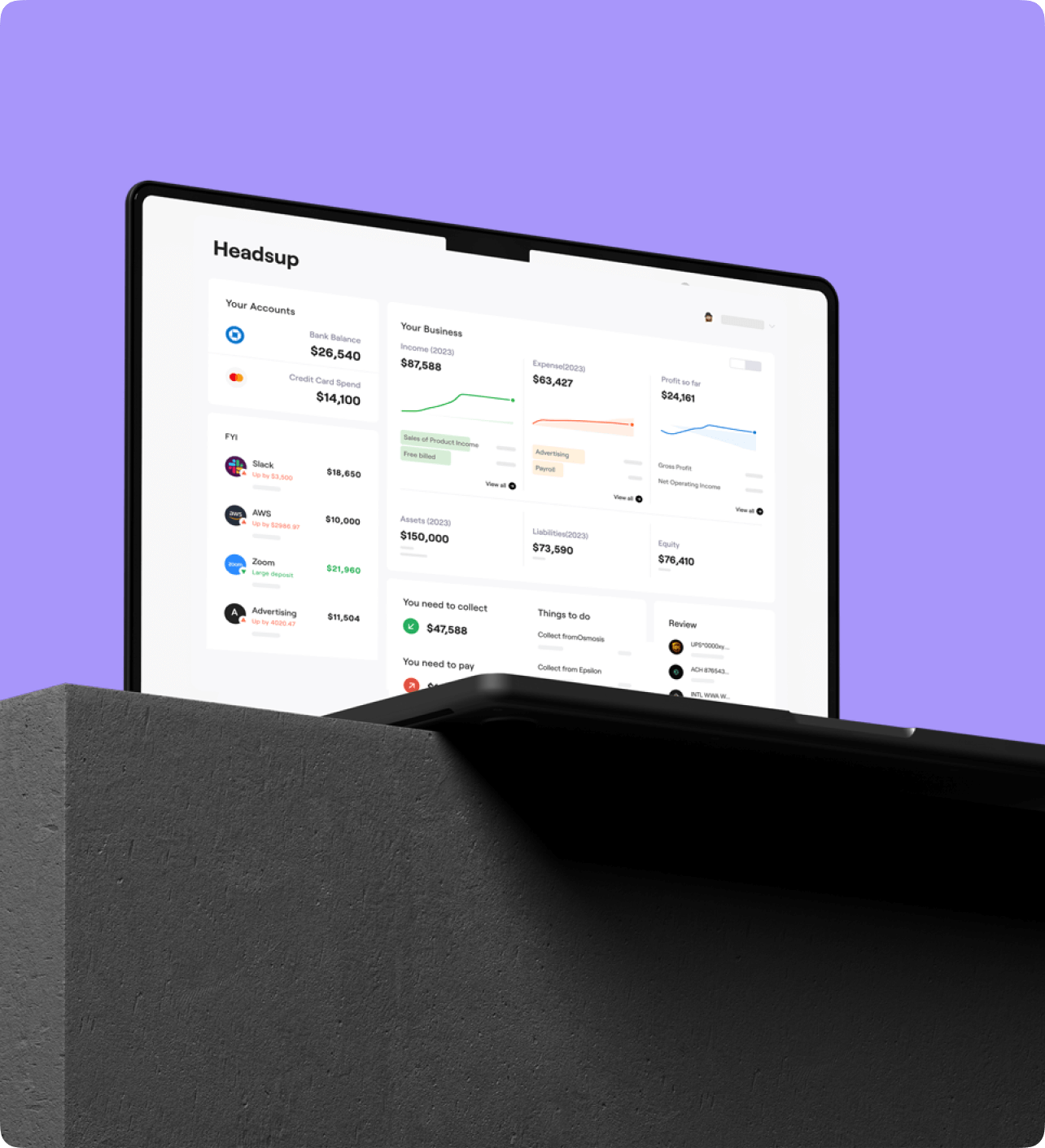Better bookkeeping
Meet Fincent — The only solution that combines beautiful software, human bookkeepers, and obsessive customer support. Now you can grow your business, keep costs down, and still have time for life
Leave the old ways behind
240+
hours freed up every year
24x7
access to financial reports and insights
$11k+
saved annually on bookkeeping and taxes

For us, Fincent is not just a service; they are a strategic partner in our growth story.
Cody Franklin • Unified IT

“Fincent has transformed my financial management.”
Grant Sapkin • Burrrst

"Super easy, super supportive, and super responsive."
Dr. Kwab Ofori-Ansah • PhysioCare Rehab & Wellness
Businesses, big and small, trust Fincent with their books
Squeaky clean books
Get up-to-date, balanced, and verified books by the 15th of every month
Reconcile books that haven’t been updated in ages with Catch-Up Bookkeeping
Use the default accrual-basis method or request that your books be maintained on a cash-basis
Watch the money roll in
Create digital invoices, request payments, and remind customers about overdue bills
Bear the transaction costs yourself or bake it into your customers’ invoices
Give your clients the option to pay you through ACH, credit, or debit cards
Stay two steps ahead of the IRS
Receive year-round support to file both your business and personal taxes
Outsource every step of the tax filing process for your your S-Corp, LLC, or any other type of business entity
Get a professional to prepare, review, and verify your forms before you sign it
Trusted by legendary business owners
“Fincent has saved my business over $25k in just a few months. I've now onboarded three of my companies to the platform — the team does a great job of categorizing expenses and the dashboard makes it easy to review everything.”
Sophia Amoruso

- Built 3 multi-million dollar companies
- 15+ years of experience as a business owner
- Featured on America's Richest Self-Made Women List, 2016
The perfect solution does exist.
It's staring you in the face.
Powerful Search
Find invoices, transactions, and subscriptions quickly with Fincent's built-in search engine.
Powered by real bookkeepers
Your dedicated bookkeeping team with 100+ hours of experience is always just a DM away.
Never out of sight
Forward email invoices or upload images of bills and see them magically appear in your books.
Your financial chat history
Track average spends, lifetime costs, and total earnings for every vendor, subscription, and customer.
Plugs and plays
Start afresh or pick up where you left things off by importing your QuickBooks files into Fincent.
Vendors will love you
Pay vendors through your connected bank accounts or credit cards right from within the app.
Export ready reports
Gather deep insights around your financial operations with readymade P&L statements, balance sheets, and cash flow reports.

Kelsey WilLock
Founder, Aura Finance
“Fincent is intuitive, easy to use, and a lifesaver. It has significantly reduced costs and saved us countless hours on financial tasks.”
Kelsey WilLock
Founder, Aura Finance
70%
transactions auto-categorized
30+
reports created

Gaia Richards
Founder, Blue Earth Healing
“Fincent, a reliable crew, handled my books with care, offering invaluable financial clarity on our business journey.”
Gaia Richards
Founder, Blue Earth Healing
80%
Reduction in Manual Financial Tasks
60%
Boost in Tax Compliance

Cody Franklin
Founder, Unified IT
“Fincent transformed our finances, enabling us to innovate. Their dedication makes them a strategic partner in our growth.”
Cody Franklin
Founder, Unified IT
80%
transactions auto-categorized
30+
reports created
Find out how much
you can save
Bookkeeper’s hourly rate
55
>$400
Monthly expenses
50
500k+

Thinking about pricing?
We'll take the price challenge!
Our customers consistently recognize Fincent for delivering high-quality software and expert service. Our pricing is the most competitive in the small business accounting space.
“Wait, my next Acme Inc. subscription is going to cost me $4000?”
Grow smarter and slash competition with strong financial data on your side.
Get startedGreat on its own but also connects with your favorite tools
Flip through some flippin' good resources
Building the Right Bookkeeping Model for Your Construction Business
Bookkeeping is the cornerstone of financial success for construction businesses. By recognizing the significance of bookkeeping, construction companies can overcome the unique challenges they face and build a strong financial infrastructure. From maintaining compliance and achieving financial visibility to optimizing project cost management and navigating cash flow fluctuations, effective bookkeeping empowers construction businesses to drive growth and profitability.
Read moreHow is Bookkeeping Different for Marketing and Advertising Agencies
By setting realistic marketing budgets, identifying tax-deductible expenses, and streamlining reconciliation and reporting processes, marketing agencies can optimize their financial management. These practices contribute to improved financial stability, better decision-making, and long-term success in the dynamic marketing industry.
Read moreSmall Business Bookkeeping 101
Learn how small businesses can handle bookkeeping effectively and scale faster with clean books.
Read moreNever Run Out of Cash Again: A Founder's Guide to Cash Flow Health
Learn all about cash flow health so your business is stable in the long run.
Read moreSmall Business Tax Filing: What You Need Before You File
Learn about the basics of tax filing, mistakes your need to avoid, and go through our tax preparation checklist to have a smooth tax season.
Read moreWhy Should Small Businesses Automate Account Reconciliation
Read how automated account reconciliation can save you time and money and reduce errors for improved financial health.
Read moreWhat are Vendor Payments and How Fincent Makes It Easy
Learn all about vendor payments, how the process works, and how Fincent can help you automate the process.
Read moreManual vs Automated Expense Tracking: What’s Better for Your Small Business
Read about the difference between manual and automated business expense tracking and see what your business needs.
Read moreWhat is Transaction Auto-Categorization? How Does Fincent’s Auto-Categorization Feature Work?
Read how transaction auto-categorization helps you understand your finances better and how Fincent is using AI to improve the process.
Read moreSee more to believe more
Take it for a spin
Learn how Fincent manages your finances in this interactive product tour
Take a tourWatch it in action
Check out a pre-recorded walkthrough video of the product and all the things it can do.
Watch the demo








